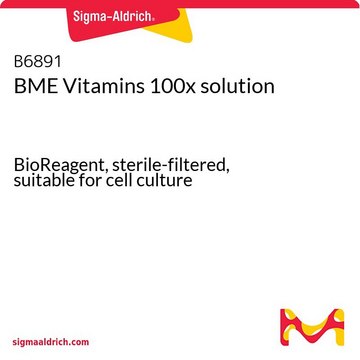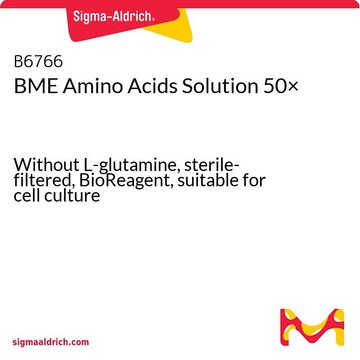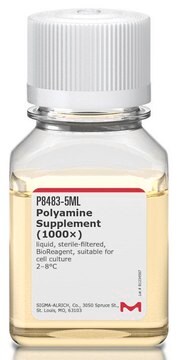R7256
RPMI 1640 Vitamins Solution (100×)
liquid, sterile-filtered, BioReagent, suitable for cell culture
Synonym(s):
RPMI 1640 Solution, RPMI 1640 Vitamins, Vitamins Solution
Sign Into View Organizational & Contract Pricing
All Photos(1)
About This Item
UNSPSC Code:
12352205
NACRES:
NA.75
Recommended Products
sterility
sterile-filtered
Quality Level
product line
BioReagent
form
liquid
technique(s)
cell culture | mammalian: suitable
impurities
endotoxin, tested
color
yellow to dark yellow
pH
7.2-7.6
shipped in
dry ice
storage temp.
−20°C
General description
Roswell Park Memorial Institute medium is commonly referred as RPMI. It is a form of medium used in cell culture and tissue culture. This medium contains phosphate and is formulated for use in a 5% carbon dioxide atmosphere. RPMI 1640 is used for the serum-free expansion of human lymphoid cells.
Application
RPMI 1640 Vitamins Solution (100×) has been used:
- in the preparation of CeM1 medium for the isolation of Caenorhabditis elegans germ cells
- as a component of the amino-acid-deprived medium for the starvation of intestinal porcine enterocytes
- as a component of the stage-8 medium for culturing of human pluripotent stem cell-derived 3D pancreatic progenitor clusters
RPMI 1640 Vitamins Solution (100×) is used as a supplement in cell culture media.
Storage Class Code
10 - Combustible liquids
WGK
WGK 3
Flash Point(F)
Not applicable
Flash Point(C)
Not applicable
Choose from one of the most recent versions:
Already Own This Product?
Find documentation for the products that you have recently purchased in the Document Library.
Customers Also Viewed
Leucine stimulates ASCT2 amino acid transporter expression in porcine jejunal epithelial cell line (IPEC-J2) through PI3K/Akt/mTOR and ERK signaling pathways
Shihai Z, et al.
Amino Acids, 46(12) (2014)
Indranil Biswas et al.
Journal of bacteriology, 189(18), 6521-6531 (2007-07-10)
Streptococcus mutans, the principal causative agent of dental caries, produces four glucan-binding proteins (Gbp) that play major roles in bacterial adherence and pathogenesis. One of these proteins, GbpC, is an important cell surface protein involved in biofilm formation. GbpC is
Simon Kemmerling et al.
Journal of structural biology, 177(1), 128-134 (2011-11-19)
A versatile methodology for electron microscopy (EM) grid preparation enabling total content sample analysis is presented. A microfluidic-dialysis conditioning module to desalt or mix samples with negative stain solution is used, combined with a robotic writing table to micro-pattern the
Simon Kemmerling et al.
Journal of structural biology, 183(3), 467-473 (2013-07-03)
The stochastic nature of biological systems makes the study of individual cells a necessity in systems biology. Yet, handling and disruption of single cells and the analysis of the relatively low concentrations of their protein components still challenges available techniques.
Alexandra S Vagasi et al.
Bio-protocol, 7(15) (2017-09-05)
The Caenorhabditis elegans germ line is an important model system for the study of germ stem cells. Wild-type C. elegans germ cells are syncytial and therefore cannot be isolated in in vitro cultures. In contrast, the germ cells from tumorous
Our team of scientists has experience in all areas of research including Life Science, Material Science, Chemical Synthesis, Chromatography, Analytical and many others.
Contact Technical Service











